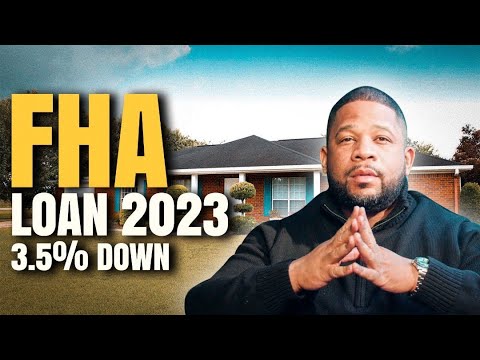Unlocking the Door to Homeownership: An Overview of FHA Loans
Owning a home is a quintessential American dream, and the Federal Housing Administration (FHA) has long been helping folks turn that dream into a reality, particularly those stepping onto the property ladder for the first time. FHA loans sprung into existence back in the 1930s to galvanize homeownership during a time when most Americans struggled to acquire a piece of the pie. Fast-forward to today, and FHA loans still offer a helping hand to those with dreams bigger than their wallets, especially enticing for first-time buyers looking for a leg-up in the slippery real estate game.
From their lenient credit requirements to their generous lending limits, FHA loans are packed with benefits that can tip the scales towards homeownership for many. Buckle up, my friends, as we take you through a journey of discovery, revealing why FHA loans might just be the apple of your eye, particularly for those new to the homeownership game.

Understanding FHA Loans: The Basics First-Time Buyers Should Know
Question on your mind: what exactly is an FHA Loan? Think of it as your fairy godmother in the form of a government-backed mortgage. Unlike conventional loans that come with stricter requirements, an FHA loan’s charming carriage is powered by a promise from the FHA to back the loan – reducing the risk for lenders and offering a safety net that allows for more lenient qualification criteria.
The differences between FHA and conventional loans boil down to a few key points. An FHA loan typically requires a lower minimum credit score – think 580 to just say “Hello!” to a 3.5% down payment, or even 500 if you’ve got a more substantial 10% to put down. Conventional loans, meanwhile, may give you the cold shoulder unless your credit score is ‘dressed to impress’.
Key concepts of FHA Loans:
– MIP (Mortgage Insurance Premium): It’s like a bouncer for your loan, guarding it against default, and it’s a must-have, even if it means an upfront cost of 2.25% and a recurring fee throughout the life of the loan.
– Loan Limits: The FHA isn’t Santa Claus; they’ve set home price qualifying maximums. But don’t fret; they’re typically generous enough to embrace a range of comfortable abodes for your pickings.

| Feature | Details |
|---|---|
| Minimum Credit Score | – 580 for a 3.5% down payment. |
| – 500 for a 10% down payment. | |
| Down Payment | – As low as 3.5% of the home’s purchase price with a credit score of 580 or higher. |
| – 10% with a credit score of 500-579. | |
| Mortgage Insurance Premium (MIP) | – Upfront MIP: 2.25% of the loan value which can be financed into the loan. |
| – Annual MIP: Also required and varies based on loan amount, term, and loan-to-value ratio. | |
| Loan Terms | – Typically, 15 or 30 years. |
| Maximum Loan Amount | – Varies by county. The FHA sets limits based on the area’s median home price. |
| Property Requirements | – Must meet HUD’s safety, security, and soundness standards. |
| Borrower Eligibility | – Must be a primary residence. |
| – Borrower must have a steady employment history or have worked for the same employer for the past two years. | |
| Debt-to-Income (DTI) Ratio | – Generally, 43% is the highest DTI ratio a borrower can have to qualify, but exceptions can be made up to 50% with strong compensating factors. |
| Closing Costs | – Can be paid by the seller up to 6% of the home price, by the lender, or through a down payment assistance program. |
| Benefits | – Low down payments. |
| – Low credit score requirements. | |
| – Gift funds allowed for down payment and closing costs. | |
| – Seller or lender can pay closing costs up to a specified limit. | |
| Disadvantages | – Required MIP can be costly in the long run. |
| – Home price limits may restrict purchase options. | |
| – Property must be appraised by an FHA-approved appraiser and meet specific FHA criteria. | |
| Potential Disqualifiers | – High debt-to-income ratio. |
| – Poor credit. | |
| – Insufficient funds for down payment, monthly mortgage payments, or closing costs. |
Navigating the Financial Landscape: FHA Loan Requirements and Eligibility
For the financial newbie, marching into the mortgage maze can be daunting, but don’t let the credit score benchmarks scare you off. A 580 credit score and you’re in the 3.5% down-payment club, while a 500 score has you saving a bit more cash upfront. But what these numbers bring to light is a more forgiving attitude towards those without immaculate credit.
Eligibility-wise, a giant boulder that could trip you up is a high debt-to-income ratio (DTI) – a measure of your monthly debt payments against your income. FHA loans prefer you keep this figure modest to ensure you’re not biting off more mortgage than you can chew.
Smaller Down Payments: A Gateway for First-Time Homebuyers
Let’s get real; saving for a down payment can feel like trekking Mount Everest, but here’s where FHA loans flex their muscles. While conventional wisdom might call for a 20% down payment to dodge Private Mortgage Insurance (PMI), FHA loans only ask for 3.5% if your credit score is smiling at 580 or higher, creating a much smoother path to getting those house keys.
The impact here goes beyond the upfront savings. We’re talking a ripple effect on the long-term affordability of your home. Putting less cash down doesn’t just mean more money in your piggy bank for rainy days; it means potentially entering the housing market sooner and starting to build equity before prices hike up again.

Mitigating Credit Challenges: Why FHA Loans are Forgiving for New Buyers
Here’s the deal: FHA loans don’t turn their nose up at a less-than-perfect credit history like conventional loans might. They roll out the welcome mat. Our friends at the FHA understand that everyone stumbles, so they’ve set credit requirements that are more like a comfy cushion than a stiff armchair.
It’s like FHA is the kindly teacher who sees potential in every student. Even if your credit score’s report card has a few blemishes, FHA loans could give you the nod to go ahead and secure that mortgage, offering a critical foothold for first-time buyers aiming to transform their credit story from a tragedy into a triumph.

Closing Cost Assistance and Grants: Exclusive Perks with FHA Loans
True, the upfront MIP fee might seem like a hurdle, but there’s a silver lining: closing cost assistance and grants that dance beautifully with FHA loans. This patchwork of programs can trim down out-of-pocket expenses like a well-aimed hedge trimmer, making the financial garden of homeownership more manicured for the first-time buyer.
Delving into this array of programs, we unearth grants and financial aids that could very well put a sweet cherry on top of your FHA loan sundae. They can provide a lifeline that turns the typically dreaded closing costs into a hurdle you can bunny-hop over with ease.
Navigating Private Mortgage Insurance (PMI) vs. Mortgage Insurance Premium (MIP)
Let’s parse this MIP business, shall we? Unlike its conventional cousin, PMI, which can eventually be canceled, MIP sticks to you like a gum on a shoe – both at the beginning and over the course of the loan. Yes, it’s one of those evil necessities that enable the FHA to endorse loans for those who might get the stink-eye from traditional lenders. But hold on, savvy buyer, this should not deter you. Sure, it’s extra outgoings, but it’s the trade-off for more accessible terms and a brighter doorway into homeownership.
Long-Term Benefits and Considerations: Refinancing and Equity Building
So, you’ve got an FHA Loan. What’s next on the path to financial savvy? Looking ahead, there’s the tantalizing option to refinance. If your credit improves or interest rates treat you favorably, you could snag an even more beneficial mortgage down the line, potentially converting your FHA to a conventional loan and waving goodbye to that sticky MIP.
What’s more, with each mortgage payment, you’re not just a borrower; you’re building equity, crafting a financial springboard that could propel you to greater heights, whether that’s a future home upgrade or a cushy safety net.
Success Stories: Real-Life Impacts of FHA Loans on First-Time Buyers
We could wax lyrical about FHA loans all day, but actions speak louder than words. So let’s spill the beans on folks who’ve walked this path before. These are the tales of the everyday heroes who saw the Promised Land of homeownership, despite credit scores that wouldn’t win any beauty contests. With a little help from FHA loans, they’ve planted their flags in their own slices of the American dream.
From the single parent who overcame credit card debacles to the bright-eyed couple who thought their student loans had barricaded the homeownership door, these stories beam with the power of FHA loans to carve a path where there wasn’t one before.
Innovative Loan Solutions: FHA Loan Variants and Upgrades for First-Time Buyers
Constantly evolving, FHA loans aren’t content with resting on their laurels. For first-time buyers, there’s an array of specialized FHA Loan types, like the Energy Efficient Mortgage for the environmentally conscious or the 203k for those unafraid of a fixer-upper.
And just when you think you’ve got the script, FHA loans throw in a plot twist with recent enhancements – adapting to market and policy shifts, and ensuring they remain a relevant actor on the mortgage stage. For instance, you can keep tabs on changes in lending limits and MIP costs to arm yourself with the best info when choosing an FHA loan – much like keeping an eye out for difference between Fico score And credit score.
The Dark Horse of Real Estate Financing: Critically Examining FHA Loans
But hold your horses; we’ve been singing FHA’s praises, yet it’s time for a dose of tough love. The truth is, FHA loans are not the Holy Grail for every first-time buyer. The addition of MIP, for one, can feel like paying for a ticket to a show you didn’t attend. Then there’s the fact that FHA imposes loan limits that might confine your house hunt to a smaller cage.
Thus, dissecting the decision is critical. The goal isn’t just to land a home but to do so on financially favorable grounds. Granting serious thought to the drawbacks helps in not just avoiding potential pitfalls but mastering the art of the mortgage.
Conclusion: Embracing the FHA Loan Advantage as a First-Time Buyer
We’re closing the curtain on this comprehensive chat about FHA loans, and here’s the kicker: they’re custom-built for the first-time buyer keen on breaking into homeownership without needing a treasure chest upfront. It’s about providing a safety net for those whose financial history may be speckled with past mistakes, offering the promise of a home where conventional loans might not.
So, to the hopeful homebuyer out there, consider the FHA loan as the friendly guide helping you chart the course through the wilds of the mortgage landscape. Keep your eye on the prize, and let the FHA loan pave your way to the treasured milestones of homeownership. With care, diligence, and the right knowledge, the FHA loan could very well be your ticket to laying the first brick of your personal empire.
Remember, as the mortgage world evolves, so do the tools at your disposal. Embrace the FHA loan advantage with the gusto of an explorer discovering new lands, and watch as the seeds of your homeownership dreams sprout into a robust, leafy reality.
Unlock the Perks: The Scoop on FHA Loan Benefits for First-Timers
Hey there, future homeowners! Are you on the edge of your seat, ready to dive into the world of real estate? If you’re a first-time buyer, you might be wondering how on earth you’ll wade through the maze of mortgage options out there. Well, pull up a chair, because we’re about to spill the tea on FHA loans, the superhero of home loans for newbies!
The Down Payment? It’s No Biggie with FHA!
Let’s kick off with something that’s music to everyone’s ears—the down payment. You know how saving up a down payment can sometimes feel like trying to get an exclusive Hulu student discount? Well, FHA loans make it way easier. Instead of that hefty 20% that traditional loans love to see, FHA loans let you sneak in the door with as low as 3.5% down! It’s like snagging the best deal without the need for a secret handshake.
Credit Scores Getting You Down? Not Anymore!
Now, let’s talk credit scores. They can be like those mysterious celebrity disappearances; you never know what What Happened To Andrew tate, and you sometimes can’t figure out why your score dipped. But hey, FHA loans have your back! They’re cool with credit scores that aren’t quite as stellar as Apple Paltrows( latest performance. You can get your foot in the door with a score as low as 580. Talk about a sigh of relief, right?
Closing Costs and Escrow? Oh, They’ve Got Tricks Up Their Sleeve!
Alright, let’s waltz over to closing costs and escrow. These two can feel a tad overwhelming, you know, like trying to track an Airtag Miles away. But fear not! FHA loans allow sellers to contribute up to 6% of the home price towards your closing costs. Plus, they’ll hook you up with an escrow account to manage your insurance and tax payments. No more nail-biting over those pesky annual bills—FHA’s got a handle on that!
Interest: A Fixed Affair That’s Oh So Sweet
When it comes to interest rates, FHA loans are like a comforting bowl of mac and cheese—they’ll stick with you. Opting for an FHA loan means saying ‘I do’ to a Fixed-rate Mortgage, so your rate stays put for the life of the loan. Even if the market goes on a rollercoaster ride, your payments are as predictable as reruns of your favorite sitcom. Stability for the win!
Here’s the Skinny
Now that we’ve chatted up a storm about FHA loans, you’re probably feeling more in the know than ever. These loans are packed with benefits, ready to make your first home purchase smoother than your favorite streaming binge. So go ahead, dip your toes into the housing market ocean, and let FHA loans give you that life jacket of confidence. After all, who said buying your first home couldn’t be as easy as pie?

What is a FHA loan and who qualifies?
What is a FHA loan and who qualifies?
Well, let’s break it down! An FHA loan is a government-backed mortgage that gives a leg up to folks who might not have a fat wallet for a hefty down payment or the credit history that’s as clean as a whistle. It’s ideal for first-time homebuyers or those with less-than-perfect credit scores. If you’ve got a steady income, a reasonable debt-to-income ratio, and at least a fair credit score, you could be in the running for this type of loan.
What is the downside to a FHA loan?
What is the downside to a FHA loan?
Hold your horses before you jump on the FHA loan bandwagon! The downside? You’ll be shelling out for mortgage insurance—upfront and over the life of the loan—which can make your wallet feel a little lighter. Plus, there’s usually a cap on how much you can borrow, which means if you’ve got your eye on a palace, it might be out of reach with an FHA loan.
What will disqualify you from an FHA loan?
What will disqualify you from an FHA loan?
Don’t get your hopes up too high; certain slip-ups can boot you out of the running for an FHA loan. Major no-nos include a recent bankruptcy or foreclosure, a history of late payments, or debts the size of Mount Everest. And if you’re trying to stretch the truth on your application, well, you can kiss that FHA loan goodbye.
How hard is it to get a FHA loan?
How hard is it to get a FHA loan?
Guess what? Snagging an FHA loan isn’t like pulling teeth. It’s designed to be more accessible, so if your credit’s not in the dumpster and you’re not drowning in debt, you could be sitting pretty. Just be sure to have all your ducks in a row and be as honest as the day is long on your application.
What is the income limit for the FHA loan 2023?
What is the income limit for the FHA loan 2023?
Here’s the scoop—there’s no specific income ceiling to qualify for an FHA loan in 2023. The real deal is whether you’ve got enough dough rolling in to cover your debts and the mortgage without breaking a sweat. The FHA’s more about your ability to pay than how much you earn.
Can anyone use FHA?
Can anyone use FHA?
Almost! FHA loans aren’t exclusively for a secret club. They’re open to first-time homebuyers, repeat buyers, and even refinancers. But keep in mind, the house must be your primary residence—so no using an FHA loan for a vacation home or an investment property.
Why do sellers avoid FHA?
Why do sellers avoid FHA?
Sellers can be a jittery bunch, and they might steer clear of FHA loans like a cat avoids water. Why? Because the FHA has strict rules and the appraisal process is tougher than a two-dollar steak. Sellers worry it’ll be a long, bumpy road to closing or they might have to fix a laundry list of things.
Why do sellers refuse FHA loans?
Why do sellers refuse FHA loans?
You’ve got to see it from the seller’s point of view—they’re not just being difficult. With FHA loans, the fear of the unknown looms large. They chew their nails over the appraisal process, which can be as nitpicky as Grandma at Thanksgiving, and they dread potential delays. Sometimes, they just want a sure thing, and they think a conventional loan is less hassle.
Why is it so hard to buy a house with an FHA loan?
Why is it so hard to buy a house with an FHA loan?
It ain’t a piece of cake, that’s for sure. Some sellers turn up their noses at FHA loans because of the strict inspection and appraisal standards, thinking it could throw a wrench in the works. Plus, with more hoops to jump through, the whole process can feel like a marathon. But for the right buyer, it’s still a race worth running.
How long does it take for FHA approval?
How long does it take for FHA approval?
Well, don’t hold your breath, but don’t plan your retirement around it either. It typically takes between 30 to 60 days to get the FHA’s nod of approval if your paperwork is as neat as a pin and your financials check out. Just remember, good things come to those who wait!
What is the FHA 100 mile rule?
What is the FHA 100 mile rule?
Listen up, movers and shakers! The FHA’s 100-mile rule is for those of you with wanderlust. If you’re relocating and your new pad is more than 100 miles from your old digs, you might be able to swing a second FHA loan. But you’ll need a good reason, like a job transfer, not just a hankering for a change of scenery.
Can a seller refuse an FHA loan?
Can a seller refuse an FHA loan?
Sure can! It’s a free country, after all. A seller can turn down an FHA offer faster than a kid dodges broccoli. They might be spooked by the appraisal process or afraid it’ll slow things down. While it can be a bummer, it’s their call to make.
How much money do you need for a FHA?
How much money do you need for a FHA?
Brace yourself—it’s not peanuts, but it’s not a king’s ransom either. Typically, you’ll need to cobble together a down payment of at least 3.5% of the home’s purchase price. So if you’re eyeing a $200,000 home, you’ll need $7,000 itching to be spent. And don’t forget closing costs and other fees!
How much credit do you need to get an FHA loan?
How much credit do you need to get an FHA loan?
No need to be a member of the 800 Credit Score Club, but you can’t be bottom-of-the-barrel either. Generally, you’ll want a credit score of at least 580 to put just 3.5% down. If you’re hovering around 500-579, you might still qualify, but you’ll need a 10% down payment. So, the better the score, the better your chances.
What is the first step to getting an FHA loan?
What is the first step to getting an FHA loan?
Alright, it’s game time! The first play is to scrub up your financial situation—gussy up that credit score, pile up some savings for a down payment, and get your debt under control. Next, link up with an FHA-approved lender and they’ll guide you through the homebuying maze—piece of cake!
What does your credit score have to be to qualify for an FHA loan?
What does your credit score have to be to qualify for an FHA loan?
You don’t need credit that sparkles like a diamond, but it can’t be in the gutter either. You’re looking at needing a score of at least 580 to cozy up to that sweet 3.5% down payment. If your score’s between 500 and 579, brace yourself for a 10% down payment. Anything lower and you might be out of luck, champ.
Is FHA based on income?
Is FHA based on income?
Nah, FHA loans don’t have an income requirement, but you’ve gotta have enough cash flowing in to handle your mortgage and your other bills, without sweating bullets every month. It’s not about how chunky your paycheck is, but how well you juggle your finances.
How long does it take for FHA approval?
How long does it take for FHA approval?
Let’s circle back—you’re aiming for around 30 to 60 days for the green light from FHA if your financial house is in order. Of course, a little patience never hurt. It’s like waiting for a pot to boil—watched loans never close. But stick with it, and you might just get there!



